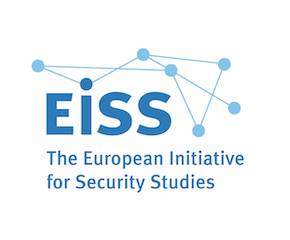Conveners
Open Panels: (In)security and Organized Crime in Latin America
- Margarita Petrova (IBEI)
Open Panels: Civil-Military Relations in Challenging Times
- Stephen Saideman (Carleton University)
Open Panels: Challenges and Opportunities for Post-Cold War NATO
- Marcel Plichta (University of St Andrews)
Open Panels: Intelligence Success and Failure in Historical Perspective: Lessons from Beyond the Anglo-Sphere
- Eva Michaels (IBEI)
Open Panels: Addressing Wicked Problems in Cyber Conflict
- Julia Carver (University of Oxford)
Open Panels: Re-Visiting the Political Economy of Security
- Moritz Weiss (LMU Munich)
Open Panels: Psychology and Emotions in War and Strategy
- Katerina Krulisova (Nottingham Trent University)
Open Panels: Alliance Management
- Jeffrey Michaels (IBEI)
Most lethal violence now occurs outside of war zones. In Latin America, countries like Mexico, Brazil, El Salvador, and Honduras have often had yearly homicide rates exceeding those in Afghanistan or Syria. In 2018, 78,667 people were killed violently in Brazil and 43,089 in Mexico, compared with 29,584 in Afghanistan and 16,905 in Syria in the same year. Direct conflict deaths now account for...
The war in Ukraine reminds us of the stakes involved in civil-military relations. How do democracies ensure that their militaries are most effective while facing new challenges posed by technology and increasingly complex missions and battlefields? The papers in this panel address increasingly important yet still understudied issues: how to manage the inclusion of artificial intelligence in...
Recently, Russian aggression against Ukraine and the twin prospects of Swedish and Finnish accession to NATO have refocused scholarly attention on the alliance. NATO’s responses to emerging strategic dilemmas–in part sparked by these developments–have important implications for policymakers, strategists, and citizens. Moreover, they offer immensely valuable information to security scholars,...
The cyber domain is filled with “wicked problems” (Churchman 1967, Rittel and Webber 1973, Conklin 2006). Be they how and when to attribute a cyber attack, how democracies should respond to election interference, integrating the cyber domain in wargames, or finding the best models and experimental methods to understand international cyber security.
Because they are the "symptom or result...
Today both the empirical focus of scholarly enquiry and the conceptual framing of intelligence studies still remain firmly rooted in the experiences of the Anglosphere and liberal democratic political tradition, the US primarily, but also the UK and the Five Eyes Alliance (Van Puyvelde & Curtis, 2016). With probably the sole exception of the Soviet/Russian intelligence, interest in “other”...
Throughout the Macron presidency, the French government persistently used the ‘European sovereignty’ discourse to advocate for a ‘Europe of defence’. ‘Strategic autonomy’ is a core component of this broader discourse and refers to the EU’s capacity to provide for its own security needs. For the purposes of this article, we define ‘strategic autonomy’ as a point where the integration of core...
The war in Ukraine has once again shifted global defense policies and continues to cause economic turmoil. Against this backdrop, we are witnessing vivid debates on the political economy of security highlighting the close connection between the two domains of security and economics. The objective of this panel is to shed light not only on those recent developments, but to take a broader – also...
How do citizens of U.S. allies assess different reassurance strategies? This article investigates the effects of U.S. reassurance policies on public opinion in allied states. We design and conduct a survey experiment in five Central-Eastern European states---Estonia, Latvia, Lithuania, Poland, and Romania---in March 2022. Set against the backdrop of Russia's invasion of Ukraine, this...
Psychology and emotions are integral to war, strategy, and the management of insecurity. This is evidenced by the ongoing Russian-Ukrainian war and the passions that permeate it at every level of analysis. It is also apparent in the huge amount of attention the classical writers on strategy, from Thucydides to Carl von Clausewitz to Joseph Wylie and Thomas Schelling, dedicated to understanding...
Against the backdrop of both an exacerbation of the threat environment and growing uncertainty about the reliability of the US security guarantee, in recent years allies in Europe and the Indo-Pacific have begun reinforcing their militaries. Such efforts were framed as necessary, at least in part, for the sake of alliance cohesion: greater burden-sharing would make the alliance more attractive...
Authors:
Andrea Gilli, Mauro Gilli, Nina Silove
In recent years, the United States and its Allies have adopted the concept of Multi-Domain Operations to handle the return of Great Powers’ rivalry, the diffusion of anti-access/area-denial capabilities, as well as the opportunities and vulnerabilities generated by emerging technologies – including cyberattacks and manipulation of the...
To meet the pacing challenge of a rising China, the United States seeks to devote increased resources and attention to the Indo-Pacific. Some have argued that the United States can free up resources by withdrawing most or all of its troops from Europe. After a US drawdown, the European members of NATO would make up for the loss of US manpower and equipment, though the United States would still...

